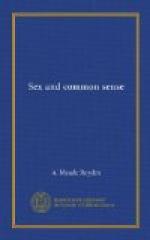It is this holding of human personality cheap that is really immoral, really dishonest: for it is not cheap. It is this which makes prostitution a horror, and prostitutes the Ishmaels of their race. They “sell cheap what is most dear,” and, knowing this, rage against their buyers. The hideously demoralizing effect of a life of prostitution on the soul is a commonplace. “These women,” it has been said, “sink so low that they cease to know what love is, they cease to be able to give. They can only cheat and steal and sell.” It is true. Whatever virtues of kindliness and pity the prostitute may (and often does) have for other unfortunates and outcasts, her attitude in general does become that of the parasite, the swindler, the vampire. Why? Because on her the deepest outrage against human personality is committed. Without a shadow of claim, without a pretence of offering its equivalent, that, in her, is bought and sold which is beyond price. Why should she not cheat and thieve? Take all she can, she cannot get the true value of what has been bought from her. Does she reason all that out? More often than we think. But whether she reasons consciously or not, she knows she has been defrauded: and she defrauds.
But it is the buying and selling, I shall be told, that makes her so vile: between such a sale and the free gift of lovers lies the whole difference between morality and immorality. I do not think so. It is the contemptuous use of another which is immoral, and though actually to buy and sell the person is the lowest depth of immorality, because it is the lowest and most brutal expression of such contempt, any lightness or irreverence is “immoral” in its degree; so therefore is conduct which makes love an evanescent thing, or the giving of personality which love involves, a passing emotion.
If we feel this to be so in friendship, surely it is more and not less true of a union so complete on every plane as that of sex. Can you take that—and give it—and pass on, as though it were a light thing?
The desire for permanence, for stability, for trustworthiness lies very deep in human nature. We may—we do—rebel against it, and speak with rapture of an unfettered existence without material ties: but even in material things the nomad is the least creative, the least civilized of his kind. His existence is neither so picturesque nor so human as we imagine. One has only to read history to see how little he has contributed to humanity—and how little he has helped to raise the human level above the animal. It is not for nothing that we find the home imposed upon human kind by the necessities of human infancy. It is the helplessness of the child that has humanized our species by creating the home which its helplessness demanded, and though a great deal that is sentimental is said about homes, this remains a fact. The nomadic, the homeless race gives little to the world; it is by nature and circumstances an exploiter of resources for which




